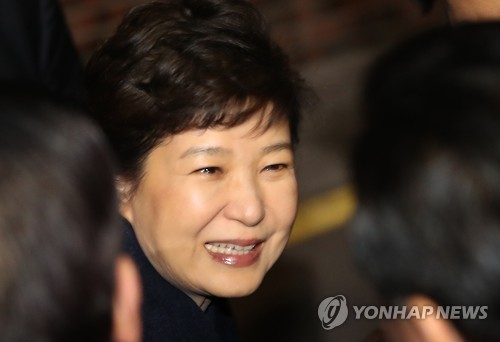Ousted President Park Geun-hye's dishonorable departure from the presidential office Cheong Wa Dae on Sunday laid bare a sharply divided nation and poor scorecards on a range of her policy initiatives.
Two days after the Constitutional Court ruled to dismiss her over a massive corruption scandal, Park, heavily guarded by her security staff, left Cheong Wa Dae -- with her core supporters calling on "our president" to stay strong and her detractors denouncing a string of her sleaze allegations.
Her scandal-tainted presidency came to a halt some 11 months before the end of her five-year term. With the historic verdict, the country is to hold a presidential by-election within two months, likely on May 9.
"I feel sorry that I have failed to complete the presidential mandate given to me," Park said in a statement that Liberty Korea Party Rep. Min Kyung-wook, Park's former spokesman, read out after Park arrived at her private residence in Samseong neighborhood, southern Seoul.

This photo, taken on Nov. 29, 2016, shows former President Park Geun-hye stepping down from a podium after a press conference at the presidential office Cheong Wa Dae in Seoul.
Park's dismissal has left most of her signature policy initiatives adrift.
They included schemes to revitalize the sluggish economy; reform the financial, education and labor sectors; build trust with North Korea; lay the groundwork for unification; and promote peace and cooperation in Northeast Asia.
In particular, her botched external policies have drawn much flak.
Four years after her presidency, cross-border relations have fallen to one of their lowest points with Pyongyang having significantly advanced its nuclear and missile capabilities through a series of provocations, including two underground nuke tests last year alone.
Her initiative to restore ties with China, the country's largest trading partner, have also been adrift with Beijing taking a series of retaliatory steps against South Korean businesses for Seoul's decision to host a U.S. missile defense system.
Park had sought to improve relations with Beijing that soured under her predecessor Lee Myung-bak who focused his foreign policy attention to strengthening ties with Washington, the country's treaty security ally.
Seoul's ties with Tokyo have also ebbed due to a series of long-festering historical and territorial issues such as Japan's wartime sexual enslavement of Korean woman and its repeated sovereignty claim to South Korea's easternmost islets of Dokdo.
Park set foot in politics with her victory in a 1998 by-election in Daegu, 302 kilometers south of Seoul, on the coattails of her high-profile father -- late former President Park Chung-hee.
Park's father is credited with laying the foundation for the country's dramatic economic ascent, though he has been heavily criticized for his authoritarian rule. The general-turned-leader led the country for some 18 years after taking power in a 1961 military coup.
Over the course of her political career, Park had built a reputation as a "principled, trustworthy" politician due in large part to her insistence in 2009 to stick to a controversial plan to relocate a number of key government offices to Sejong City.
But such a reputation was later overshadowed by what detractors called her "dogmatic, uncommunicative" leadership style. (Yonhap)

